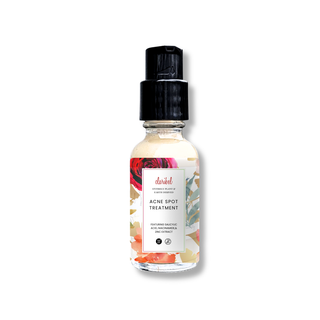
Natural Remedies for Dry Itching Scalp: Top 5 Tips
It's likely we've all suffered from a dry, itchy scalp, at some point or another, we all know how frustrating it can be. Not only is it uncomfortable and sometimes painful, but it can also be embarrassing.
In this article, we'll share with you the top 5 effective natural remedies for dry itching scalp that you need to try.
The Dilemma of a Dry Itching Scalp
A dry, itching scalp is a common condition that can be caused by a variety of factors, including cold weather, hot showers, harsh shampoos, and skin conditions like psoriasis or eczema.
Symptoms may include flakiness, redness, and a persistent urge to itch.
While there are many over-the-counter treatments available, they can often be costly and filled with chemicals that may not be good for your hair or skin. That's where natural remedies come in.
Our Repairing Hair & Scalp Mask includes a long luxurious list of ingredients to heal and soothe with zero chemicals or synthetics.
Common Causes of Dry Itching Scalp
There can be several reasons behind this discomfort of dry itchy scalp.
LACK OF MOISTURE: One common cause is a lack of moisture in the scalp. When the scalp does not receive enough hydration, it can become dry and itchy. This may happen due to factors such as weather conditions, excessive use of harsh hair products, or not drinking enough water, or waiting a while in between washes to replenish the skin. It is important to keep the scalp hydrated to prevent dryness and itchiness.
OVERPRODUCTION OF SEBUM: Another reason for a dry and itching scalp is the overproduction of sebum. Sebum is the natural oil produced by the scalp to keep it moisturized. However, when there is an excessive production of sebum, it can lead to a buildup on the scalp, causing irritation and itchiness. This overproduction can be triggered by hormonal imbalances, stress, or even certain medications. It is important to maintain a balanced level of sebum production to prevent dryness and itchiness.
FUNGAL INFECTIONS: Furthermore, fungal infections can also cause a dry and itchy scalp. One common fungal infection is known as dandruff. Dandruff is caused by an overgrowth of a yeast-like fungus called Malassezia. This fungus feeds on the natural oils produced by the scalp, leading to flaking and itching. Other fungal infections such as ringworm can also cause similar symptoms. These infections can be treated and remedied with either medicated products or home remedies.
CHRONIC SKIN CONDITIONS: In addition to these factors, certain skin conditions can also contribute to a dry and itching scalp. Conditions such as eczema or psoriasis can affect the scalp and cause inflammation, flaking, and itching. These conditions are often chronic and require proper medical treatment to manage symptoms effectively.
LIFESTYLE CHOICES: Furthermore, lifestyle choices and habits can also play a role in causing dry and itchy scalp. Poor diet, lack of proper hair care routine, excessive heat styling, or frequent use of hair products containing harsh chemicals can all contribute to scalp issues. It is important to maintain a healthy lifestyle, follow a balanced diet, and use gentle hair care products to keep the scalp healthy and free from irritation.
5 Natural Remedies That Help Correct Dry Itching Scalp
Natural remedies are a great option for treating dry, itching scalp because they are typically gentler on your hair and skin than chemical-laden products.
Additionally, many natural remedies have antibacterial and anti-inflammatory properties that can help soothe and heal your scalp.
They are also generally more affordable than commercial products, and you may already have some of the ingredients in your home.
1. Tea Tree Oil for Scalp Relief
Tea tree oil is a popular natural remedy for a variety of skin conditions, including dry, itching scalp. It has antifungal and antibacterial properties that can help reduce dandruff and soothe irritation.
To use tea tree oil for scalp relief, mix a few drops of it with a carrier oil like coconut oil or olive oil and massage it into your scalp. Leave it on for 10-15 minutes before washing it out with a gentle shampoo.
Another way to use tea tree oil for scalp relief is to add a few drops of it to your regular shampoo. This can help reduce dandruff and soothe irritation with each wash. However, be sure to use only a small amount of tea tree oil, as it can be irritating if used in high concentrations.
2. Coconut Oil for Hydrating the Scalp
Coconut oil is another popular natural remedy for dry, itching scalp. It has moisturizing properties that can help hydrate your scalp and reduce flakiness.
To use coconut oil for hydrating the scalp, warm up a small amount of it in your hands and massage it into your scalp. Leave it on for at least 30 minutes before washing it out with a gentle shampoo. You can also leave it on overnight for a deeper treatment.
Another way to use coconut oil for hydrating the scalp is to mix it with other ingredients like honey or aloe vera. This can help enhance its moisturizing properties and provide additional benefits for your scalp and hair.
3. Aloe Vera for Soothing the Scalp
Aloe vera is a natural ingredient that is known for its soothing properties. It can help reduce inflammation and soothe dry, itching scalp.
To use aloe vera for soothing the scalp, apply a small amount of pure aloe vera gel to your scalp and massage it in. Leave it on for at least 30 minutes before washing it out with a gentle shampoo.
Another way to use aloe vera for soothing the scalp is to mix it with other ingredients like coconut oil or tea tree oil. This can help enhance its soothing properties and provide additional benefits for your scalp and hair.
4. Apple Cider Vinegar for Balancing the Scalp
Apple cider vinegar is a natural remedy that can help balance the pH of your scalp and reduce dandruff and itchiness.
To use apple cider vinegar for balancing the scalp, mix equal parts of apple cider vinegar and water and apply it to your scalp. Massage it in and leave it on for a few minutes before washing it out with a gentle shampoo.
Another way to use apple cider vinegar for balancing the scalp is to add a few drops of it to your regular shampoo. This can help reduce dandruff and soothe irritation with each wash.
5. Rosemary Oil for Promoting Hair Growth
Rosemary oil is a natural remedy that is known for its ability to promote hair growth. It has anti-inflammatory properties that can help soothe dry, itching scalp and stimulate hair growth.
To use rosemary oil for promoting hair growth, mix a few drops of it with a carrier oil like coconut oil or olive oil and massage it into your scalp. Leave it on for at least 30 minutes before washing it out with a gentle shampoo.
Another way to use rosemary oil for promoting hair growth is to add a few drops of it to your regular shampoo. This can help stimulate hair growth and improve the overall health of your scalp and hair.
Combining Natural Remedies for Maximum Benefits
While each of these natural remedies is effective on its own, you can also combine them for maximum benefits.
For example, you can mix coconut oil, tea tree oil, and aloe vera together for a hydrating and soothing scalp treatment.
Or, you can mix apple cider vinegar and rosemary oil for a scalp-balancing treatment that also promotes hair growth.
Other Tips for Preventing Dry, Itching Scalp
In addition to using natural remedies, there are other things you can do to prevent dry, itching scalp. One of the most important things is to avoid using hot water when washing your hair, as this can strip your scalp of its natural oils. You should also avoid using harsh shampoos and conditioners that can irritate your scalp.
Other tips include using a humidifier to add moisture to the air, wearing a hat when you're outside in cold weather, and avoiding tight hairstyles that can pull on your hair and scalp.
Our Repairing Hair & Scalp Mask includes a long luxurious list of ingredients to heal and soothe with zero chemicals or synthetics:
Conclusion
There are some very effective natural remedies for dry itching scalp as well as our Repairing Hair & Scalp Mask, mentioned above.
Tea tree oil, coconut oil, aloe vera, apple cider vinegar, and rosemary oil are all effective natural remedies that you should try. Remember to be patient when using natural remedies, as it may take some time to see results.





